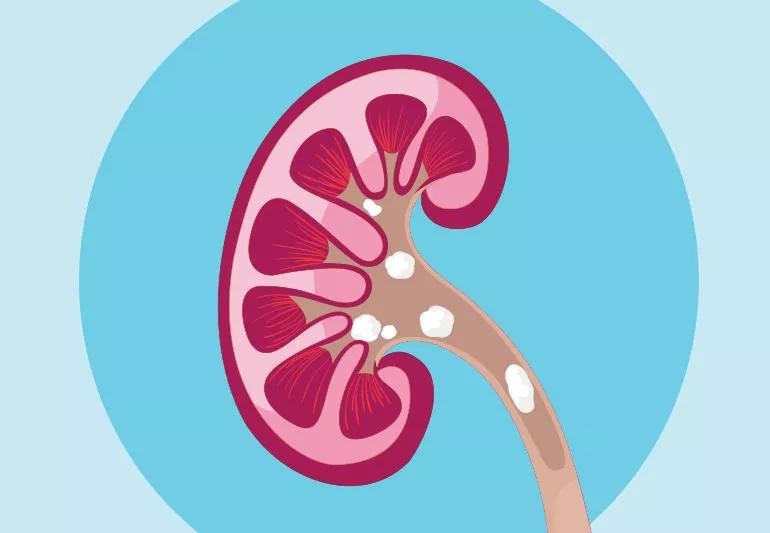With warmer temps and increased physical activity, winter stones can begin to travel

Image content: This image is available to view online.
View image online (https://assets.clevelandclinic.org/transform/119959d0-c613-471f-af27-c730658cc4e3/kidneyStone-578289680-770x533-1_jpg)
Illustration of kidney stones leaving kidney
Summer may have just officially started, but kidney stone season began a couple of weeks ago. Healthcare providers see an increase in kidney stone cases when the weather warms up.
Advertisement
Cleveland Clinic is a non-profit academic medical center. Advertising on our site helps support our mission. We do not endorse non-Cleveland Clinic products or services. Policy
Kidney stones are solid, often irregularly shaped formations made of mineral and acid salts. They can travel into your ureter, which is the tube connecting your kidney and bladder, and cause excruciating lower back pain and groin discomfort.
Kidney stones also crop up more often in southern parts of the U.S. and in regions close to the equator. Urologist Sri Sivalingam, MD, talks about why more people get kidney stones in the summer, treatment options and how to decrease your risk of getting them.
When people come to the emergency room with pain, which is usually a sign that the stone is moving, it happens more often in the summer than in the winter months.
But why is that? Well, about 80% of kidney stones are predominantly calcium-based. Studies show your body appears to produce more calcium in your urine in the winter. Having too much calcium in your urine (called hypercalciuria), ups your chances of kidney stones.
“What we know is that this excess calcium in your urine can eventually develop into kidney stones,” explains Dr. Sivalingam. “Being physically active can protect you from stone development. So, if like many of us, you’re less active in the winter, that also adds to your risk for kidney stones. Then, when warm weather hits, increased temperatures and dehydration lead to further growth of the stones that formed over the winter months and can suddenly move.”
Advertisement
It hits you right when you least expect it. Just as you were planning to go to the park or toss around the football in the yard. Ouch! That’s when you find out that the stone is actually there.
More than 3 million people — or nearly 1 person in 8 — will see a primary care physician or urologist annually for kidney stones, according to the National Institute of Diabetes and Digestive and Kidney Diseases.
“Kidney stones cause pain when the ureter, which is only 2 to 3 millimeters wide, is blocked and contracts in an attempt to squeeze the stone through into the bladder,” further explains Dr. Sivalingam. “As the ureter kidney builds up pressure and stretch, this creates a severe stabbing discomfort in the lower back and/or groin and is often associated with nausea and vomiting.”
Kidney stones vary in size — from as small as a grain of salt to as big as a golf ball — and affect all sexes almost equally. The smaller the stone, the more likely it can pass through your urinary tract without medical treatment. If you have kidney stones on the move, you may also experience bloody urine, fever and chills, and nausea and vomiting, as well as a constant urge to urinate.
Depending on the size of your kidney stone, your healthcare provider can offer recommendations as to whether you should try and let it pass naturally or suggest medications that may help with passage and pain control.
Surgery may be needed and fortunately, there are several minimally invasive options depending on the size and location of the stone.
Once you’ve had a stone, you have a 50% chance of developing another one within the next five years. This risk generally increases the older you get, too. While there isn’t a way to completely prevent kidney stones, there are several things you can do to decrease your risk.
If you want to decrease your risk of getting kidney stones, eating more fruits and vegetables can help, which makes your urine less acidic and decreases the risk of stones being able to form. Salt should be avoided, too, as this reduces the calcium in your urine. If you have a diet that’s high in sodium, work to reduce those foods and substitute them for an alternative. Salty food can include canned items, packaged meals and snacks such as potato chips.
Talk to a doctor or dietitian about diet changes if you’re at risk for getting kidney stones.
Dr. Sivalingam recommends someone at risk for kidney stones should drink enough fluids to produce at least 2.5 liters of urine per day, especially during the summer.
“Drinking plenty of water will help to dilute your urine and reduce the formation of crystals such as calcium oxalate, the substance that forms most types of kidney stones,” he says. “Making sure you are drinking enough fluids is one way you can help to prevent development of renal stones.”
Advertisement

Sign up for our Health Essentials emails for expert guidance on nutrition, fitness, sleep, skin care and more.
Learn more about our editorial process.
Advertisement
An overactive bladder, UTI, kidney stones or an enlarged prostate can affect how you urinate
Make these lifestyle changes to help prevent kidney stones
Why kidney stones in kids are on the rise (and what to watch for)
Say goodbye to kidney stone pain with these 7 expert diet tips
An expert explains a complicated relationship
6 tips to lower your risk
One is related to your urinary system, while the other is related to your digestive system
Type 2 diabetes isn’t inevitable with these dietary changes
Applying a hot or cold compress can help with pain
Pump up your iron intake with foods like tuna, tofu and turkey